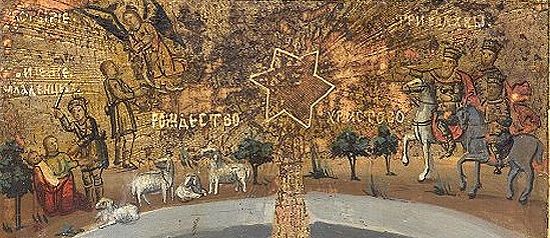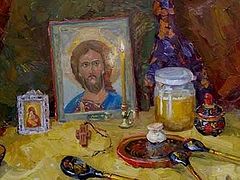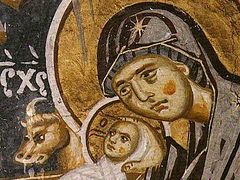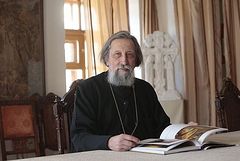Great fasts exist before great feasts according to the loftiness of the feast. Every fast is an opportunity to be reminded of our sins and to repent, and every feast is an opportunity to enter into the mystery of the event being celebrated. On Nativity, we have the opportunity to enter into the mystery of God Who, before judging, loves and sacrifices Himself for His loved ones. If we fast and struggle against the enemy, who attempts to drag us away from Christ by drowning us in worldly preoccupations and preparations for the feast, then Christ will reveal His existence inside of us—neither in the visible Earth, nor in the invisible Heaven, but in the tiny manger of our heart both visible and invisible.
He who truly fasts, with repentance and tears, awaits the feast, to celebrate it with vigils, prayers and praises. Thus, true Christians are worthy to celebrate their feasts and to enter into the mystery of Christ’s economy of their salvation. Feasts are for those who fast; those who do not fast are unable to perceive anything of the essence of these feasts—not because God does not accept them, but because they themselves are unable to meet God. As such, God did not hide from Adam, but rather, Adam was not able to face God, because he was heedless and submitted to his passions. Fasting with knowledge and discernment means only one thing: a tireless struggle against the sin that resides in us, against the passions and desires that separate us from God. This is the sacrifice that man offers to God during His feasts: a laboring soul which loves fasts and hates passions and desires. This is why we say that he who does not fast will never understand the meaning of the feast.
The Nativity Fast entered Church life at a later stage, after the feast itself was introduced in the fourth century, because the Church organized its liturgical life gradually. Nothing in Orthodoxy came down from Heaven as is, but everything in it is truly inspired from Heaven. The grace of the Holy Spirit is always present in the Church, but it is given to those who worthily participate in it. We certainly know that God sends a special grace during Church feasts, an abundant grace to those who partake of these feasts with fasting and repentance. Such shall truly be with Christ during His feasts and the celebrations of His saints.
The commemoration of these feasts does not attain its deep meaning except in the Liturgy. Here the commemoration is elevated from its devoid intellectual form to man’s true communion in this Divine grace which governs the feast. It is a grave mistake when some parishes shorten the liturgical services and celebrate feast day Divine Liturgy in the evening, for about an hour or two, after which that which belongs to Christ is over, and the worldly celebrations begin. Of course, family gatherings with food and drink are not an impediment to the celebration—what is wrong is transforming the goal of the feast into this worldly meeting, instead of living the Nativity event with vigil and night prayer to Christ Who is born for us. What meaning remains in the feast when it starts with a quick divine Liturgy, where the faithful participate without preparation, as if it is a social commitment, and ends with all-night worldly festivities? This feast should not be celebrated in the evening—the evening is not a feast day. It goes without saying that the idea of an evening Divine Liturgy is wrong altogether. This is a sin of the Church that will not be forgiven—when it starts to submit to the carelessness of its members, supporting their worldly lifestyle, which is pulled apart by passions and weaknesses. The Church, concerned for people’s salvation, which will be a minority, a remnant, does not cede even a letter of its spiritual law which lifts its faithful from being immersed in worldly cares, directing them to desire only that which belongs to God. Pastoral needs do not permit abdicating the rules of liturgical life. The goal of the Church in this world is not to gather a multitude of people who are content with a smaller dose of the essentials of Church life, but to produce saints by their living of the fullness of this spiritual, liturgical experience.
Christ became incarnate to accomplish this goal, to direct our entire life journey to Heaven. The real danger that the Church is facing today is not limited solely to worldly celebrations of Christ’s Nativity, but it is more severe: The world would lead it to wipe out the entire truth and the goal of Christ’s Incarnation, similar to what has happened in the Christian West, where Christianity has been transformed into a moral discipline, intended to establish the ideal society, rather than the new man united to Christ’s Resurrection.
Mankind waited thousands of years for this night. The whole journey of the Old Testament is completed on this night when God is incarnated, taking the form of a man. History testifies that God endured people weaknesses, sins and iniquities with great patience, in order for them to be accepted as sons instead of slaves. This is what is meant by fullness of time. Angels came from Heaven to preach to all creation about this event. Magi from the Far East came; they certainly beheld the angel who preached the conception of Christ in the Virgin’s womb, such that they arrived on the day of His Nativity. They fasted and labored, then celebrated with Christ Himself. Their lives were an expectation of this great event. They will behold in Him the Lord of the planets and the stars, coming for their salvation. As for us, as we hurry through this quick Divine Liturgy, we are somehow telling Christ: “You have Your feasts, and we have ours.” The Church should remind its faithful that the Kingdom of God is not eating and drinking, but righteousness and peace and joy in the Holy Spirit (Rom. 14:17); and this is accomplished solely in the Church, in its fasts, and in all the details of living its faith and its liturgical life.
Christians have forgotten that the Divine Incarnation revealed how God searches for man, not to bind his freedom, but to give him His own Self. He did not come as the mighty of this age; God revealed Himself in this humble way, not to show that He is really meek and humble of heart, but because this is the only way that does not negatively affect man’s freedom in his belief in God. Through this humble Incarnation, God maintained man’s opportunity to freely discover God.
God did not create us for death but for life. The goal of the Incarnation is to beget us again from this eternal death that we voluntarily accepted: For the Son of Man has come to seek and to save that which was lost (Lk. 19:10). The festal hymns teach us how to prepare for the coming salvation: “Come, God-inspired faithful, arise and behold the descent of God from on high! He manifests Himself to us in Bethlehem! Let us cleanse our minds, and offer Him a life of virtue instead of myrrh. Let us prepare with faith to celebrate His Nativity, storing up spiritual treasure and crying: Glory to God in the Highest!”




